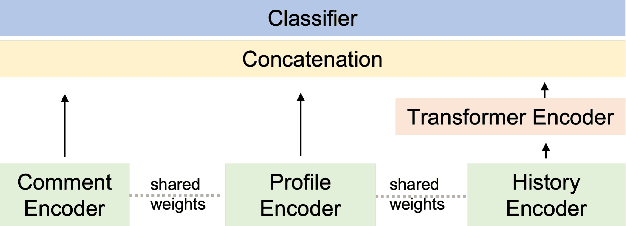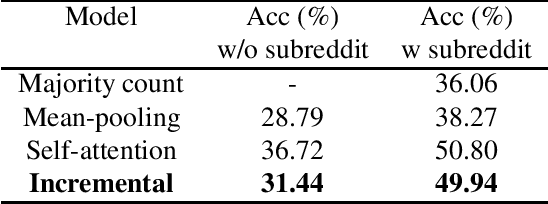Ruixue Lian
MDSEval: A Meta-Evaluation Benchmark for Multimodal Dialogue Summarization
Oct 02, 2025Abstract:Multimodal Dialogue Summarization (MDS) is a critical task with wide-ranging applications. To support the development of effective MDS models, robust automatic evaluation methods are essential for reducing both cost and human effort. However, such methods require a strong meta-evaluation benchmark grounded in human annotations. In this work, we introduce MDSEval, the first meta-evaluation benchmark for MDS, consisting image-sharing dialogues, corresponding summaries, and human judgments across eight well-defined quality aspects. To ensure data quality and richfulness, we propose a novel filtering framework leveraging Mutually Exclusive Key Information (MEKI) across modalities. Our work is the first to identify and formalize key evaluation dimensions specific to MDS. We benchmark state-of-the-art modal evaluation methods, revealing their limitations in distinguishing summaries from advanced MLLMs and their susceptibility to various bias.
Learning Label Hierarchy with Supervised Contrastive Learning
Jan 31, 2024Abstract:Supervised contrastive learning (SCL) frameworks treat each class as independent and thus consider all classes to be equally important. This neglects the common scenario in which label hierarchy exists, where fine-grained classes under the same category show more similarity than very different ones. This paper introduces a family of Label-Aware SCL methods (LASCL) that incorporates hierarchical information to SCL by leveraging similarities between classes, resulting in creating a more well-structured and discriminative feature space. This is achieved by first adjusting the distance between instances based on measures of the proximity of their classes with the scaled instance-instance-wise contrastive. An additional instance-center-wise contrastive is introduced to move within-class examples closer to their centers, which are represented by a set of learnable label parameters. The learned label parameters can be directly used as a nearest neighbor classifier without further finetuning. In this way, a better feature representation is generated with improvements of intra-cluster compactness and inter-cluster separation. Experiments on three datasets show that the proposed LASCL works well on text classification of distinguishing a single label among multi-labels, outperforming the baseline supervised approaches. Our code is publicly available.
Incremental user embedding modeling for personalized text classification
Feb 13, 2022



Abstract:Individual user profiles and interaction histories play a significant role in providing customized experiences in real-world applications such as chatbots, social media, retail, and education. Adaptive user representation learning by utilizing user personalized information has become increasingly challenging due to ever-growing history data. In this work, we propose an incremental user embedding modeling approach, in which embeddings of user's recent interaction histories are dynamically integrated into the accumulated history vectors via a transformer encoder. This modeling paradigm allows us to create generalized user representations in a consecutive manner and also alleviate the challenges of data management. We demonstrate the effectiveness of this approach by applying it to a personalized multi-class classification task based on the Reddit dataset, and achieve 9% and 30% relative improvement on prediction accuracy over a baseline system for two experiment settings through appropriate comment history encoding and task modeling.
 Add to Chrome
Add to Chrome Add to Firefox
Add to Firefox Add to Edge
Add to Edge